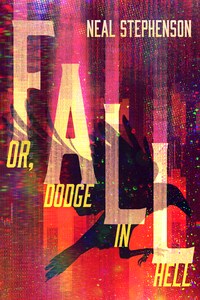The Borough Press
An imprint of HarperCollinsPublishers Ltd
1 London Bridge Street
London SE1 9GF
www.harpercollins.co.uk
First published in Great Britain by HarperCollinsPublishers
Copyright © Neal Stephenson 2019
Cover design by Mike Topping © HarperCollinsPublishers Ltd 2019
Cover images © Shutterstock.com
Neal Stephenson asserts the moral right to be identified as the author of this work.
A catalogue copy of this book is available from the British Library.
This novel is entirely a work of fiction. The names, characters and incidents portrayed in it are the work of the author’s imagination. Any resemblance to actual persons, living or dead, events or localities is entirely coincidental.
All rights reserved under International and Pan-American Copyright Conventions. By payment of the required fees, you have been granted the non-exclusive, non-transferable right to access and read the text of this e-book on screen. No part of this text may be reproduced, transmitted, down-loaded, decompiled, reverse engineered, or stored in or introduced into any information storage and retrieval system, in any form or by any means, whether electronic or mechanical, now known or hereinafter invented, without the express written permission of HarperCollins.
Source ISBN: 9780008168827
Ebook Edition © June 2019 ISBN: 9780008168841
Version: 2019-05-16
Dodge became conscious. His phone was burbling on the bedside table. Without opening his eyes he found it with his hand, jerked it free of its charging cord, and drew it into bed with him. He tapped it once to invoke its snooze feature. It became silent. He rolled onto his side and slid the phone under his pillow so that, when the alarm resumed in nine minutes, he would be able to put it back into snooze mode with less trouble. It was a small miracle that his brain contained a sufficient 3-D model of his bed and its surroundings that he was able to do what he had just done without opening his eyes. But there was no reason to press his luck.
He felt no particular desire to go back to sleep, for he had been enduring a curiously boring dream whose central plot seemed to be the difficulty of finding coffee. In this dream, he was in the small town in Iowa where he had grown up. Its landscape and its cast of characters were commingled with places he had been and people he had encountered during the decades since he had left it in the rearview mirror of his pickup truck. But the grid street pattern of that town, covering just a few square blocks, and easily mastered by a boy on a bicycle, was, decades later, the spatial lattice on which virtually all of his dreams were constructed. It was the graph paper on which his mind seemed to need to plot things.
In the dream, he had set out to get some coffee, only to find himself thwarted at every turn by any number of incredibly prosaic obstacles. In the story-world of the dream, this was bizarrely frustrating; it was simply unreal how so many contingencies could get in the way of this simple task.
But from the point of view of the awake, or at least snoozing, Dodge, it all had a clear explanation: it was, in fact, very difficult to obtain coffee while lying in bed with one’s eyes closed.
During the next hour, he hit “snooze” several more times. In between, he slept. But it was a twilight sleep, semiconscious and mindful for a few minutes at a time, until his thoughts would lose coherence and stray into blurry wisps that were to real dreams as cobwebs are to spiderwebs.
He wondered whether the designers of the phone had performed clinical studies on snoozers in order to decide on the nine-minute interval. Why not eight minutes, or ten? The makers of the phone were famously particular about design. This had to have been data-driven. It was no coincidence that Dodge was being afforded just enough time to lose the thread of consciousness before the alarm went off again. If the interval had been much shorter, he would not have had time to drift off and so this feature could not have truly been called a snooze alarm. Much longer, and the snooze would have deepened into true sleep. He was able to maintain a rough count: I have hit the snooze button three times. Five times. Enough times that I have overslept by about an hour.








